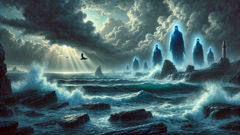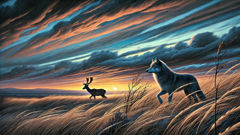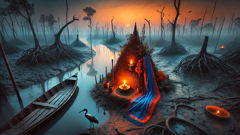Introduction
Between the jagged coastlines of Scotland’s northern mainland and the brooding, windswept isles of the Outer Hebrides lies a stretch of water known as the Minch. This channel, restless and often shrouded in a silvery mist, has inspired stories as old as the Gaelic tongue itself. For centuries, fishermen, sailors, and islanders whispered tales of enigmatic beings that rose from the churning depths—neither wholly man nor beast, but unmistakably otherworldly. These were the Blue Men of the Minch, creatures with skin as blue as indigo, eyes bright as the cold northern stars, and voices that echoed like the wind itself. The Minch was their domain, a place where tides obeyed no clock, and the weather could shift from gentle calm to tempestuous fury in the blink of an eye. Those who dared cross its waters at dusk or beneath a moonless sky watched the waves for signs: a ripple where none should be, a flash of cerulean in the spray, or the haunting sound of laughter rolling across the waves. Mariners told of challenges issued in rhyme, riddles posed by the Blue Men to test their wit and courage, with the price of failure often a watery grave. On dark nights, islanders gathered by peat fires, recounting old encounters—some terrifying, some strangely beautiful—each tale embroidered with the lingering fear and awe these mysterious guardians inspired. The legend endures, woven into the fabric of Hebridean life and the wild, unpredictable beauty of the sea that shapes it.
Storm-Swept Waters: The Arrival of Captain Ewan MacLeod
The spring of 1468 was unseasonably wild, even for the Outer Hebrides. The wind howled through the gorse and bracken, and the Minch churned with ceaseless motion. On the western shore of Lewis, the fishing village of Gearrannan crouched against the elements, its stone cottages weather-beaten but resolute. In the tavern at the heart of the village, men gathered after long days on the sea, sharing tales to keep the darkness at bay.
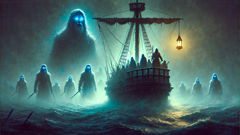
Captain Ewan MacLeod was new to these waters—a tall, sharp-eyed man with a reputation for daring the roughest seas. He’d come from the mainland with a sturdy galley, hoping to trade for herring and kelp. The villagers respected his seamanship but warned him of the Minch’s treacherous moods. Ewan, pragmatic and brave to a fault, dismissed their warnings with a wry smile.
One evening, as twilight deepened and the last rays of sun died on the water, Ewan sat with Morag, the village wise-woman. Her face was creased with age, her eyes as sharp as a gull’s. She spoke in a low voice: “Ye may think the sea is yours to command, Captain, but the Minch belongs to others. Mind the Blue Men, for they love to toy with strangers.”
Ewan laughed, but Morag pressed on. “They’ll test ye with riddles and rhymes. Fail, and they’ll pull ye down to join them. Answer true, and they may let ye pass. Never show fear, but never show pride either.”
A few days later, the galley set sail for Stornoway. Ewan steered a course close to the middle of the Minch, eager to shave hours off his journey. The sea was unusually calm at first, reflecting a sky dappled with cloud and fading light. But by midnight, the calm had turned sinister; fog drifted in, so dense it muffled sound. Ewan stood at the prow, senses sharpened, when he heard it—a strange, lyrical chanting that seemed to rise from beneath the hull.
The crew grew uneasy as the water darkened around them, taking on a blueish hue that seemed to glow from below. Suddenly, hands—long, webbed, and impossibly strong—gripped the sides of the galley. Blue faces emerged from the waves, their features both beautiful and unnerving: high cheekbones, pointed chins, and eyes shining with intelligence and mischief.
Their leader, broader and taller than the rest, spoke in flawless Gaelic: “Who dares cross the Minch on a moonless night? Answer us this, Captain, if you value your life: What is both the cradle and grave of men, never resting, never tamed?”
Ewan’s mind raced. He remembered Morag’s advice and replied, voice steady: “The sea—she gives and she takes, cradle and grave alike.”
A ripple of approval passed through the Blue Men. Their leader smiled, showing sharp white teeth. “You are clever, Captain. One more riddle: What can hold the sea yet has no walls or door?”
Ewan frowned, searching for meaning. The answer came with the memory of a lullaby his mother used to sing. “A net,” he said quietly.
The Blue Men laughed, their voices echoing across the waves. The fog began to thin, moonlight breaking through at last. “You may pass, Captain, but remember—pride before the sea is always punished.” With that, they slipped beneath the surface, leaving only gentle ripples and the faintest shimmer of blue in their wake.
The galley reached Stornoway unscathed, the crew silent with awe. News of Ewan’s encounter spread swiftly, and even the most skeptical villagers looked at the sea with new respect. Ewan himself was forever changed—less quick to laugh at old tales, and always listening for strange voices on the wind.
Rhymes and Riddles: The Challenge of the Minch
The legend of the Blue Men spread further after Captain MacLeod’s tale. Fishermen became even more careful in their dealings with the sea, and parents used the stories to teach children humility and cleverness. Yet, for some, the lure of the unknown remained irresistible.
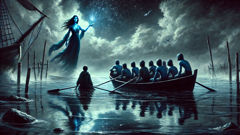
One such soul was Isla MacSween, a fisherwoman’s daughter from Ness. Unlike her peers, Isla was fascinated rather than frightened by tales of the Blue Men. She’d listen to old men spinning yarns by the fire, memorizing every riddle and rhyme, every detail of encounters both terrifying and enchanting. Isla’s father, Donald, was wary of her curiosity but recognized her strong spirit and sharp mind.
One late summer night, as a storm brewed over the Minch, Isla slipped from her cottage and made her way to the water’s edge. She’d brought her small rowboat and a heart full of questions. As thunder rolled and lightning flashed, she pushed off from shore, rowing with determination toward the heart of the channel.
At first, only rain and wind answered her. But as midnight struck, the storm ceased as suddenly as it had begun. The sea flattened, becoming as smooth and reflective as black glass. In that silence, Isla heard singing—deep and resonant, both beautiful and haunting. She peered over the side of her boat and gasped as blue-skinned figures surfaced, forming a circle around her craft.
Their leader was different than she expected: a Blue Woman, tall and regal, with hair flowing like seaweed and eyes as pale as dawn. "Why do you come alone to our domain, child of Ness?" she intoned.
Isla steeled herself and replied, "I seek knowledge, not conquest. Will you test me, as you tested Captain MacLeod?"
The Blue Woman smiled. "Very well. Answer true, and you may leave with what you seek. Fail, and you will join our dance beneath the waves."
The first riddle came: "What lives without breath, as cold as death; never thirsty, always drinking?"
Isla thought hard and remembered an old tale: "A fish," she answered.
The Blue Woman nodded, pleased. "What flies forever, rests never?"
Isla smiled. "The wind."
A ripple of laughter passed through the Blue Men. The Blue Woman’s eyes sparkled. "One final riddle: What has roots as nobody sees, is taller than trees, up, up it goes, and yet never grows?"
Isla grinned—she’d heard this one before. "A mountain."
The circle parted, and the Blue Woman reached out, offering Isla a handful of iridescent sea-glass. "You are clever and respectful. Remember: the sea is generous to those who honor her mysteries, but merciless to the arrogant. Carry this glass as proof of your passage and a warning for others."
Isla returned to Ness at dawn, her rowboat gliding through calm waters. The villagers marveled at her tale and the shimmering glass she brought home. From that day forward, Isla was known as a friend to the sea, a living bridge between the world of men and the realm of the Blue Men.
Tides of Fate: The Betrayal and Redemption of Angus MacRae
As years passed, stories of the Blue Men of the Minch became part of everyday life in the Hebrides. But where some found wonder and wisdom in these tales, others saw only an obstacle to be conquered or outwitted. Angus MacRae was one such man—a merchant from Ullapool with ambitions as vast as the sea itself.
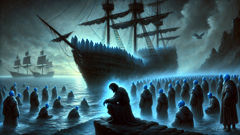
Angus believed that fear of the Blue Men was superstition holding back commerce. With a new, fast ship built for trade, he planned to cut directly across the Minch at night to gain an advantage over his rivals. He scoffed at warnings, declaring himself master of wind and wave.
On the eve of his voyage, Angus hosted a feast. He toasted to fortune and mocked those who trembled at stories of blue-skinned spirits. As his crew prepared to depart, a hush fell over the harbor; even the gulls seemed to sense something amiss.
The night was moonless and cold. Angus stood at the helm as his ship sliced through the waves, his mind focused only on profit. But as they neared the heart of the Minch, the wind died and the sea grew eerily calm—too calm. The water glimmered with an unnatural blue light. From the depths, the Blue Men arose: dozens, their eyes cold and ancient.
Their leader’s voice rang out: "Angus MacRae, why do you challenge the sea’s guardians?"
Angus sneered. "I fear no legend. Step aside or be swept aside."
The Blue Men responded not with anger but with a sorrowful chant that echoed across the water. The ship’s progress slowed as if the very sea resisted her movement. Suddenly, the hull groaned—icy water began to seep in despite the crew’s frantic efforts.
Desperation replaced arrogance. Angus fell to his knees at the prow and cried out, "Spare us! What do you want?"
The leader replied: "The sea humbles those who show no respect. Will you accept your lesson?"
Angus bowed his head. "I will. I was wrong."
The Blue Men circled the ship, their voices rising in a haunting melody. Gradually, the water receded from the hull. The wind returned, filling the sails. As dawn broke, the Blue Men vanished into the light, leaving Angus and his crew shaken but alive.
Angus never again mocked the legends. He became a patron of the local chapel and taught his children and grandchildren to greet the Minch with reverence. His redemption was spoken of for generations, a reminder that hubris at sea courts disaster—but humility brings mercy.
Conclusion
The legend of the Blue Men of the Minch has endured through centuries of wind and wave, spoken in Gaelic whispers and woven into every fishing net cast upon those storied waters. Their presence reminds the people of the Hebrides that nature holds mysteries far deeper than human pride can fathom. Whether testing wit with riddles or punishing arrogance with storms, the Blue Men are more than mere monsters—they are symbols of nature’s wildness and wisdom, ancient guardians who keep balance between humanity and the sea. From Captain Ewan’s clever answers to Isla’s respectful curiosity and Angus’s hard-won redemption, each encounter with the Blue Men passes into village memory, enriching the culture and teaching that courage, humility, and reverence for the unknown are as necessary for survival as nets and sails. Even now, as ferries cross the Minch and satellites track every swell, islanders still watch for a flash of blue beneath the foam or a strange voice riding the wind. The story continues, shaped by each new generation that listens for riddles on the water and learns to greet the mysteries of nature with open eyes and open hearts.

